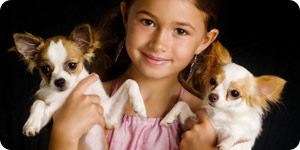
Owning a dog is a big responsibility-even if you are only responsible for a 15 lb Bichon Frise or a wee Toy Terrier. Small dogs come with their share of problems and challenges just as larger breeds do. Before you go out and buy a small dog, here are some potential issues that may come up for small dog owners, as well as ways of successfully owning a small pooch.
- All Breeds Are NOT Equal. Saying that all small dogs are the same is a mistake. Pugs are different than Bichons, just as Doberman Pinschers are different than Labrador Retrievers. Each breed of dogs has its own personality, its own hang-ups, its own pros and cons. Small dogs cannot be lumped together so easily, however there are certain similarities which make it easy to talk about small dogs as a whole.
- Barking. Not all small dogs yip and bark, but many do. You won’t see a pug barking ferociously at the mailman, but many a poodle and terrier will. As a rule, small dogs bark. Before you buy a small dog, ask the breeder and do research on the breed’s predisposition to barking. Some breeds that are notorious barkers are the Bedlington Terrier, Border Terrier, Jack Russell Terrier, Cairn Terrier (can you see a trend here?), Chihuahua, and Dachshund. Stubborn. If you do get a barker, all is not lost. You need to train her to remain in control and to limit her noise and bad behavior. Some breeds are more “trainable” than others. For instance, Bichons, Maltese, and Havanese breeds are intelligent and like to be taught. Terriers, by and large, can be stubborn and training will take patience. Do research on your chosen breed prior to your purchase.
- Protective and Needy. Many small dogs are, by nature, protective and clingy to their owners. Lapdogs want to do just want their name implies. These dogs are not the sort to be let out of the house for the day to relax in the doghouse; they want to be with you 24-7. Again, not ALL lapdogs are like this, but remember, there is a reason they are called lapdogs. Some dogs notorious for being clingy to their parents are Bichon Frise, the Maltese, the Yorkshire Terrier, and Shih Tzu.
- Health Problems. Purebred dogs in the smaller breeds tend to have health problems based on the fact that they are bred to be small with infantile traits. Orthopedic problems and heart complications are two of the most common issues for small breed dogs. Some small dogs have problems with the bones in the knee joint. This condition, know as Legg-Calve-Perthes, begins when the head of the femur bone of one or more of the legs dies and as a result one leg is shorter than the others. A Portosystemic Shunt can plague small dogs as well. A “PSS” is an abnormal blood vessel that allows blood to bypass the liver. This condition can be fatal if not checked.
- Male or Female? Males suffer from Legg-Calve-Perthes in a 4 to 1 ratio. Other health problems affect female dogs more than male dogs, like a Portosystemic Shunt. Ask the breeder about common ailments for the specific breed you are looking into.
- Long Life. Smaller dogs live longer, in general, than big dogs. If you think you only want a dog for the short time, best not buy a Chihuahua puppy-they are the longest living dog.
- Grooming. Some small dog breeds, including the Maltese, Havanese, Bichon Frise, Poodle, Papillon, and Pomeranian need constant hair care. The hair of these dogs tends to tangle and get matted, so daily brushes and weekly or biweekly grooming is necessary. Make sure your purse can afford this constant hair attention, as dog groomers are not cheap these days.
- Underfoot. By their nature, small dogs are underfoot. If you have rambunctious children or other large pets, smaller breeds, particularly toy breeds, can feel threatened. In some instances, their lives can be in danger if humans are not careful. If your household is not orderly enough to keep a small pet around (for fear of stepping on it!), do not get a tiny dog. Your home may be more suited for a Labrador or a Golden Retriever.
- General Care For Your Dog. Small dogs, as a rule, need consistent attention. They, like all dogs, need food at a regularly scheduled time, and water available at all times. Small dogs, certain breeds in particular, need regular grooming. Many of the types of dogs that fall into the toy, terrier, and teacup categories, need training so that they do not become spoiled and aggressive towards visitors. When your dog is a puppy, you need to instill proper manners, no matter how small she is.
Just because the breed you choose has a reputation for barking, being clingy, or having health issues, does not mean YOUR dog will. Just as with children, it is all about the rearing. If you teach your dog to be self-sufficient (as much as a dog can), not to beg (by not feeding her table scraps), and if you maintain a health exercise regime and diet for Fido, you may be all set. So, be aware of what a small dog may bring to your home, but be prepared to mold your animal into the pet of your choice with proper training.
